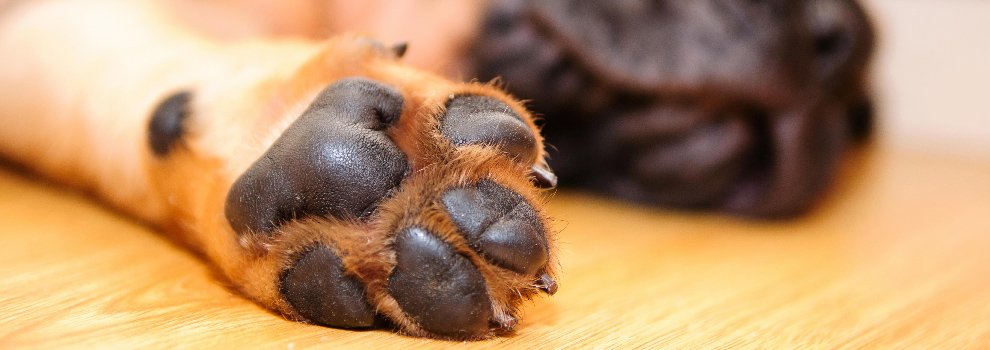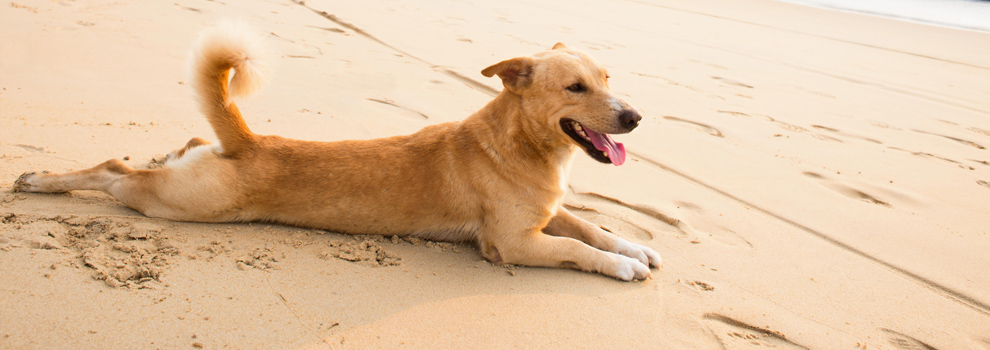Yes! Just like you and I, dogs also do get sunburns. A dog sunburn is a common occurrence mainly in areas with little or no fur like the belly, nose, ears, paws, and mouth.
A dog with a lot of sun exposure isn’t anything to ignore since it can not only be irritating and painful. Reoccurring or untreated burns can result in an increased risk of skin cancer. Dogs that are particularly light-colored or white dogs with fair skin are at a higher risk for sunburn.
Dog That Gets Sunburned The Most

While dog sunburns affect all types of dogs, there are specific dog breeds that are more prone to getting sunburned. Typically, all canines notwithstanding their coat thickness have precise vulnerable areas of their body that have less or no fur.
As mentioned earlier, areas such as around the belly and ears in dogs feature delicate skin, increasing their chances of getting sunburns. Moreover, a dog’s nose can also get dried out and sore. Nonetheless, some dog breeds are more prone to getting sunburns. For instance, white or light-skinned dogs tend to have fair skin just beneath their fur-hence greater susceptibility to sun damage.
Not only working dogs, but dogs with naturally thin hair, and more so the hairless breeds also have a higher chance of getting sunburned and even getting cancer.
What Breed Of Dog Gets Sunburned?
- Boxer
- Chinese Crested
- American Staffordshire Terrier
- Greyhound
- Boxer
- Whippet
- Dalmatian
- White German Shepherd
- Weimaraner
Risks Of Sunburn in Dogs
Sunburn in dogs is not just a minor inconvenience but a serious health concern that can lead to various degrees of skin damage. Understanding the risks and types of burns that can occur is essential for pet owners to take preventive measures and seek appropriate care when needed.
Here are the different types of sunburn that dogs can suffer from:
- Superficial partial thickness burns: typically affect the top skin layer resulting in red skin without any blisters.
- Deep partial thickness burns: these affect the dog’s skin surface layer as well as some deeper skin layers. Such type of burn can be compared to standard second-degree burns in humans although the dog doesn’t usually develop blisters.
- Full thickness burns: these types of burns generally affect the skin layer of your dog and potentially even take their toll on the tissue beneath the bottom skin layer. These types of burns are usually excruciating and mandate veterinary care.
How Do I Tell If My Dog Is Sunburned?
When it comes to sunburns, the symptoms are relatively acute, subsequently developing within 1 hour after exposure to the sun and getting to its peak within just three days. Generally, the most prevalent symptom is painful, reddened skin. You may notice vocalization of pain during movement or when your dog is touched. If you notice blistering and inflammation in your dog’s skin, this is a severe sunburn, and you should see a veterinarian.
The most commonly affected areas usually include the nose, ears, around the eyes, and on the back of the dog. Some other symptoms although on rare occasions can include fainting, weakness, and shock primarily because of heat exhaustion.
Signs of Sunburn
- Reddened skin
- Dry, cracked skin
- Your dog may be scratching and perhaps even whimpering
- The pup unnaturally shies away from touch
- Curling just at the edge of its ears
Besides the apparent signs and symptoms, are there any long-term effects of sunburns?
Yes, sunburned skin is initially reddened, scaly and painful. However, with continued exposure, nodules and bumps may develop. A sunburned pet often scratches or licks the affected region. This can result in thickened skin, leading to bleeding of the lesions. Sunburn also irritates or even aggravates skin conditions like squamous cell carcinoma lesions.
How To Treat Dog Sunburn?

Besides the obvious step of taking your dog to a veterinary clinic, there are several ways that you can use to treat dog sunburn. If you have experienced sunburn before and now have a pet with sunburns, you can use the same approach, tactics, and home remedies for your pet, as you would typically use yourself.
Usually, a typical oatmeal bath using lukewarm water with the oats subsequently ground into powder can help soothe your dog’s sunburned and dry skin. Another useful home remedy would be applying Aloe Vera in your pup’s bath as this can help alleviate its pain. Similarly, you can also add neem oil as you bathe your pet which can effectively help hasten the healing process quite significantly. Lastly, you can also make use of some coconut oil as it aids in replacing the lost skin subsequently ensuring skin rejuvenation.
What Can I Use To Protect My Dog From The Sun?

If your pup goes out for a relatively long period during hot summer days, especially in the backyard, there is a need for you to protect their skin from the harmful UV sun rays. How then can you do this? Herein are a few tips you can use:
Find Shade
Just like you wouldn’t expose yourself to the sun for hours for fear of getting sunburned, you should do the same for your pup. Don’t let your pet stand for long hours in the sun-exposed, always look for some shade and ensure that they stay under the shade for as long as they please. Besides preventing sunburns, a shade can also help prevent your dog from overheating.
Dog Sunscreen
Before you set out your pup to go out in the hot sun, it is essential that you layer up their skin with individual dog sunscreen. Yes, there is a dog sunscreen! However, only go for all-natural products and be sure to refrain from using human sunscreen since the scents and artificial ingredients in the latter can significantly cause skin irritation on the canine.
Generally, the dog’s nose is among the most likely spots to get burned. Even so, be sure to use natural products since whatever product you use will usually be licked and even consumed to prevent your pup from getting sick.
One of the best products is Snout soother since it is stocked with natural SPF. It is also great since it is scent-free and is a great solution to help fast healing of an already dry. Flaked, and burned nose not to mention help prevent the occurrence of future burns.
Use Protective Clothing
Lastly, you can also get your pup some special SPF and UV sun protection clothing from various veterinary product outlets.
Can Dogs Get Sunburn On Their Paws?

Unfortunately, one of the most overlooked body parts in a dog’s body when a pet owner is seeking to protect their pup from sunburns is the paw. What most owners don’t understand is that your dog’s paw is also susceptible to sunburn. How? While many may argue that the paws face down and away from the scorching sun, the fact is that since it is hot outside, that means that the concrete or asphalt is perhaps even hotter…meaning that your dog’s paws may burn in just a few minutes!
One of the products you can use to protect your pup’s paws is PawTection. It helps safeguard your dog’s paws from damage by establishing a barrier between its paws and the hot ground. Similarly, if you notice that your dog already has dry, rough, or discolored paw pads, then your dog has unfortunately suffered from walking on hot surfaces. At such point, you can use PawSoother, another all-natural product that ensures your pup recovers ASAP!
Sunburns In Pets
Dogs can indeed get sunburns! Luckily though, by familiarizing yourself and using the tips as outlined in this excerpt, you can effectively help ensure the safety of your pet. Don’t forget your other pets can get sunburned, such as certain breeds of exotic cats.
 All About Pets
All About Pets 


